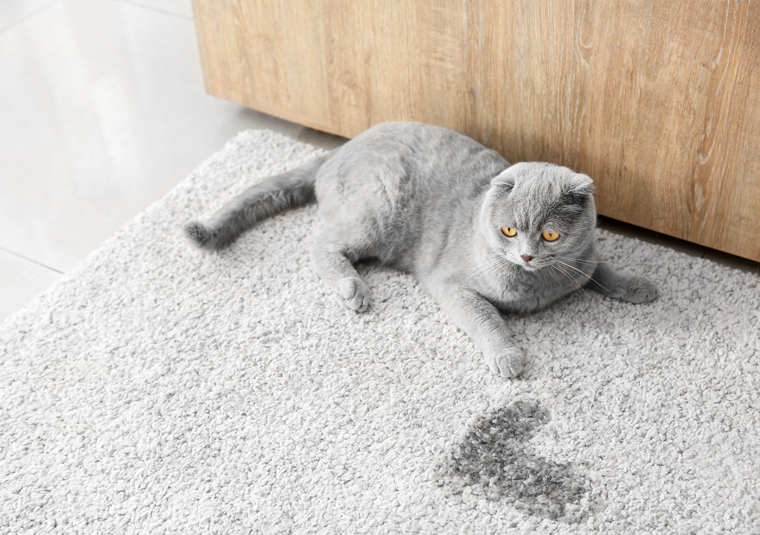Dealing with the unmistakable and pungent smell of cat urine is a common issue for many cat owners. Whether your furry friend has had an accident or marked their territory, the strong odor of cat pee can linger long after the mess is cleaned up. Fortunately, there are several effective methods to eliminate this odor and restore freshness to your home. In this article, we’ll explore the best ways to get rid of cat pee smell for good.
Why Does Cat Pee Smell So Bad?
Understanding why cat urine has such a strong and persistent odor can help you better address the issue. Cat urine contains compounds like ammonia, urea, and sulfur, which are broken down by bacteria. This breakdown process intensifies the smell, especially when the urine has dried or soaked into fabrics, carpets, or other porous surfaces. The longer the urine sits untreated, the harder it becomes to remove the smell.
Step-by-Step Guide to Getting Rid of Cat Pee Smell
Here’s a comprehensive, step-by-step guide on how to eliminate cat pee smell from your home:
1. Act Quickly
Time is of the essence when it comes to eliminating cat pee smell. The sooner you address the accident, the easier it will be to clean. If you catch the mess right away, blot up as much urine as possible using paper towels or a clean cloth. Avoid rubbing the area, as this can push the urine deeper into the surface. The key is to absorb as much liquid as possible before it has a chance to dry.
2. Choose the Right Cleaning Products
Not all cleaning products are effective at neutralizing the smell of cat urine. For the best results, you’ll want to use cleaners specifically designed to tackle pet odors.
Enzyme-Based Cleaners
Enzyme cleaners are highly effective because they contain natural enzymes that break down the proteins and compounds in urine, eliminating the odor at the source. These cleaners are safe to use on carpets, upholstery, and other surfaces where cat urine may have soaked in. Apply the cleaner generously to the affected area and let it sit for 10-15 minutes to allow the enzymes to work before blotting or wiping it up.
Vinegar and Baking Soda
If you prefer a more natural approach, a simple mixture of white vinegar and baking soda can help neutralize the odor. Vinegar’s acidity neutralizes ammonia, and baking soda absorbs odors. Here’s how to use this method:
- Mix equal parts of white vinegar and water in a spray bottle.
- Spray the mixture generously on the affected area.
- Let it sit for about 5-10 minutes.
- Sprinkle a layer of baking soda over the wet area and allow it to sit for a few hours or overnight.
- Vacuum up the baking soda to finish.
This method works particularly well on hard surfaces and lightly soiled areas.
Commercial Odor Neutralizers
If you’re looking for something more specific, many commercial products are available that are specially formulated to neutralize pet odors. Products like Nature’s Miracle, Rocco & Roxie, and Angry Orange are popular choices. These are often available as sprays or liquids and are designed to target the bacteria that cause the foul odor.
wacth on video
3. Deep Clean Carpets and Upholstery
If the cat urine has soaked into carpet fibers or furniture upholstery, a deeper cleaning is necessary. Surface cleaning won’t be enough in these cases.
Steam Cleaning
Using a steam cleaner is a great way to lift both the urine and the bacteria from deep within your carpet or upholstery. The hot steam helps to break down the compounds in the urine, while the vacuum function removes the moisture. Be sure to use a steam cleaner that’s safe for use on carpets, and you can add a pet-safe cleaning solution to enhance the results.
Professional Cleaning Services
If the odor persists despite your efforts, it may be time to call in the professionals. Professional carpet cleaning services use powerful equipment and specialized cleaning solutions that can penetrate deep into carpets and remove tough odors.
4. Tackle Hard Surfaces
If the cat urine is on hard surfaces like tile, hardwood, or concrete, you’ll need a different approach.
- Tile and Grout: For tile, use an enzyme cleaner or a vinegar-water solution to disinfect the area. Scrub the grout lines with a brush to ensure that the cleaner reaches all the nooks and crannies.
- Wood Floors: For wood, use a cleaner that is gentle enough not to damage the finish. Wipe the area thoroughly with a soft cloth and dry it completely to avoid moisture damage.
- Concrete: Concrete can absorb urine deeply, making it a challenge to clean. Use an enzyme cleaner specifically formulated for concrete, or apply a mixture of vinegar and water followed by a scrubbing brush.
5. Use Odor Absorbers and Air Fresheners
Once the urine has been cleaned, you might still notice lingering odors. To freshen the air, you can use a combination of odor absorbers and air fresheners.
- Activated Charcoal: Activated charcoal is an excellent odor absorber that can help freshen the air in your home. Place bags of activated charcoal near the affected area or in a room that has a lingering smell.
- Essential Oils: Essential oils like lavender or eucalyptus can be used in a diffuser or mixed with water and sprayed around the room. Just be sure they’re safe for pets before using them in your home.
- Air Purifiers: Consider investing in an air purifier with a HEPA filter, which can help remove airborne pet odors, dust, and allergens from the air.
6. Prevent Future Accidents
While cleaning up after your cat is essential, preventing future accidents is just as important. Here are a few tips to help keep your home smelling fresh:
- Litter Box Maintenance: Make sure your cat’s litter box is clean and in a quiet, accessible location. Cats are more likely to use the litter box if it is well-maintained and in a stress-free area.
- Multiple Litter Boxes: If you have multiple cats, provide enough litter boxes—one for each cat plus an extra. Cats can be territorial, and they might avoid the box if it feels too crowded.
- Vet Check: If your cat suddenly starts urinating outside the litter box, it may be a sign of a health issue, such as a urinary tract infection (UTI) or kidney disease. If this happens, consult with a veterinarian to rule out medical problems.
- Deterrents: If your cat continues to mark the same spot, you can try using a pet-safe deterrent spray. These products are designed to discourage cats from marking specific areas.

Conclusion
Getting rid of cat pee smell can be challenging, but with the right tools and techniques, it’s definitely achievable. By acting quickly, using the right cleaning products, and taking steps to prevent future accidents, you can keep your home smelling fresh and clean. Whether you’re dealing with a minor accident or a more stubborn issue, the methods outlined in this guide will help you eliminate the odor and enjoy a more pleasant living environment for both you and your cat.



